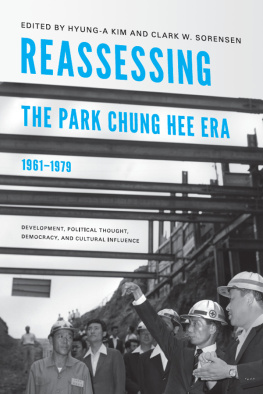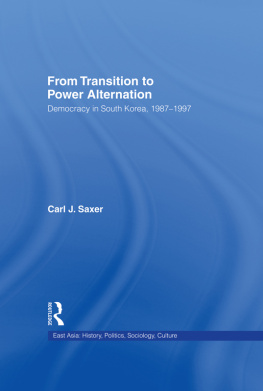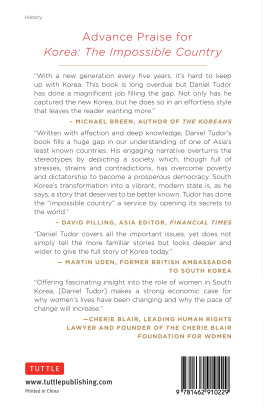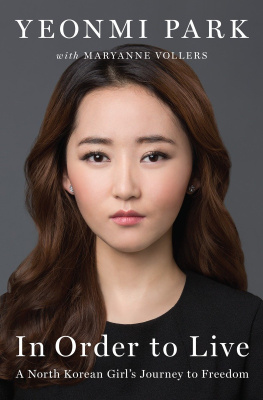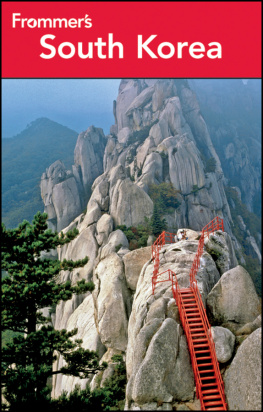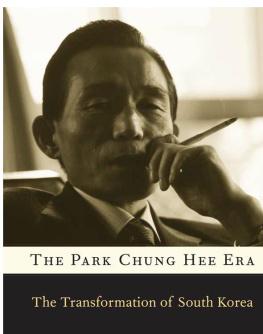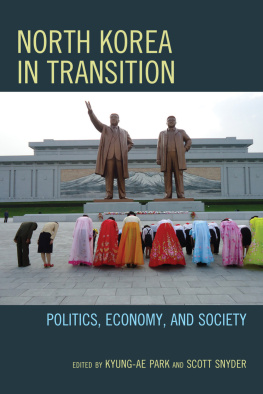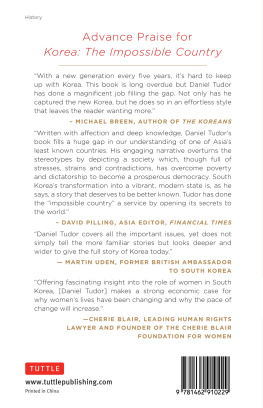Reassessing the Park Chung Hee Era, 19611979: Development, Political Thought, Democracy, and Cultural Influence
HYUNG-A KIM and CLARK W. SORENSEN, Editors
Center for Korea Studies Publications
The Northern Region of Korea: History, Identity, and Culture
Edited by Sun Joo Kim
The Center for Korea Studies Publication Series published by the University of Washington Press is supported by the Center for Korea Studies and the Academy of Korean Studies.
The Center for Korea Studies Publication Series is dedicated to providing excellent academic resources and conference volumes related to the history, culture, and politics of the Korean peninsula.
Clark W. Sorensen | Director & General Editor
| Center for Korea Studies
This book is published by the Center for Korea Studies at the University of Washington with the assistance of a grant from the Academy of Korean Studies.
2011 by the Center for Korea Studies, University of Washington
Printed in the United States of America
17 16 15 14 13 12 11 1 2 3 4 5
All rights reserved. No part of this publication may be reproduced or transmitted in any form or by any means, electronic or mechanical, including photocopy, recording, or any information storage or retrieval system, without permission in writing from the publisher.
CENTER FOR KOREA STUDIES
Henry M. Jackson School of International Studies
University of Washington
Box 353650, Seattle, WA 98195-3650
http://jsis.washington.edu/Korea
UNIVERSITY OF WASHINGTON PRESS
P.O. Box 50096, Seattle, WA 98145 U.S.A.
www.washington.edu/uwpress
LIBRARY OF CONGRESS CATALOGING-IN-PUBLICATION DATA
Reassessing the Park Chung Hee era, 19611979 : development, political thought, democracy & cultural influence / edited by Hyung-A Kim and Clark W. Sorensen.
p. cm. (A Center for Korea Studies publication)
Includes bibliographical references and index.
ISBN 978-0-295-99140-5 (pbk. : alk. paper)
e-ISBN 9780295801797
1. Korea (South)Politics and government19601988. 2. Park, Chung Hee, 19171979. I. Kim, Hyung-A, 1948II. Sorensen, Clark W., 1948
DS922.35.R43 2011
951.95043092dc23 2011025231
The paper used in this publication meets the minimum requirements of American National Standard for Information Sciences-Permanence of Paper for Printed Library Materials, ANSI Z39.48-1984.
Preface
This book grew out of the International Korean Studies Conference (IKSC) held at the University of Wollongong, Australia in November 2004 under the theme The Park Era: A Reassessment After Twenty-Five Years, which examined some of the key questions surrounding the Park era, especially how it affected Koreas development into what it is today. The conference was sponsored by POSCO, BHP, Rio Tinto, and the Australia-Korea Foundation, Department of Foreign Affairs and Trade, Australia. The IKSC attracted many distinguished participants, including twenty-six prominent figures and scholars from Australia, Korea, Japan, and the Unites States.
As the organizers of the IKSC, we strove to ensure that the presenters would deliver diverse viewpoints with a sharp focus on Koreas modern experience under Parks rule, while including a broader perspective beyond the hitherto prevailing dichotomies of industrialization versus democratization.
Reassessing the Park Chung Hee Era, 19611979, is distinctive in the sense that several authors with ideological differences, that is conservatives and progressives, are engaged in a face-to-face discussion on the Park era. In this respect, we are particularly pleased to secure a special chapter from Professor Paik Nak Chung (Paek Nakchng), a prominent literary critic and editor of the leading quarterly journal, Changbi who was also one of the two keynote speakers at the IKSC and has generously revised his original keynote paper for this book.
Paiks chapter, entitled How to Think About the Park Era, reflects on one of the key questions to which many Koreans try to find answers in the public debate on the Park era. With his understanding of such on-going public interest, whether positively or negatively, Paik examines Parks version of development which, he argues, was fundamentally unsustainable because it was built on a militarist ethos which brought about Koreas environmental destruction. Paik also views Parks version of development as unsustainable because, according to Paik it was rooted in the shallow developmental philosophy of Lets live well (Chal sara pose) which he dismisses as beggar philosophy.
This is not to say that Paik denies due acknowledgement to the extraordinary economic achievements of the Park era and to Parks choice of an exportled development model which Paik assesses as a more realistic appraisal of the possibilities actually offeredby the capitalist world-system and Koreas standing within it.
Paiks interpretation is not necessarily shared by all Koreans and thus the topic he raises remains open to further research and questioning.
In the course of preparing this manuscript, which took much longer than initially anticipated, I have received generous support from the Department of Political and Social Change at the Australian National University. Also, the Center for Korea Studies at the University of Washington partly supported my 2006 business visit there.
My sincere thanks go to all of the contributors of chapters to this book as well as to those who participated in the IKSC. From the Korean side, I would like to thank Kang Sam-Soo and Yu Han-Sik, chairman and president of EM Korea Co. Ltd, as well as Messrs Lew Byung-Hyun, Lee Hun-Kwn, and Jhee Kyung-Jun, whose joint support for this project was vital in enabling me to complete this long-awaited project.
Lastly, I would like to express my special thanks to Professor James B. Palais, who passed away in August 2006. His analysis of Koreas democracy stimulated much debate and discussion at the IKSC. His original essay, published as chapter six of this book, is therefore one of his last research-based commentaries, which will be treasured by many students of Korean studies for years to come.
Hyung-A Kim
Canberra
June 2011
List of Illustrations
TABLES
FIGURES
Introduction
HYUNG-A KIM and CLARK W. SORENSEN
In the second half of the twentieth century, the Republic of Korea (ROK) achieved a double revolution. In a few short years, South Korea shifted from an underdeveloped agricultural economy to an industrialized, high-income economy with highly developed heavy industry and information technology. During the same time South Korea shifted from military authoritarian regimes to civic democracy. These historical changes began under President Park Chung Hee (Pak Chnghi) (196179) who seized power through a military coup on May 16, 1961, and then ruled the country for almost eighteen years until his regime collapsed after his assassination on October 26, 1979. It has been widely observed that the state played a dominant role in East Asian industrialization,
During the Park era, the growth rate of South Koreas Gross National Product (GNP) averaged 8.5 percent per annum.
The top-down industrialization through the Park states guided economy became known as the Miracle on the Han River, (Hangang i kyk) and was admired by many political leaders in the region, including Deng Xiao Ping in China and Mahathir in Malaysia, who both adopted the Korean model of development for their own countries. International recognition of the ROKs successful economic development, however, did little to mollify Parks domestic critics. Over the last thirty years, especially since South Koreas democratization in 1987, many Koreans continue to question the extent to which the socio-cultural and institutional legacies of the Park era may have created the continuing imbalances in South Korean society. In the meantime, the ROKs economic miracle has baulked twice, initially in the 19978 financial crisis and again in the global economic crisis brought on largely by the U.S. in 2008, which reduced the ranking of the South Korean economy from the thirteenth largest in the world to the fifteenth.
Next page
